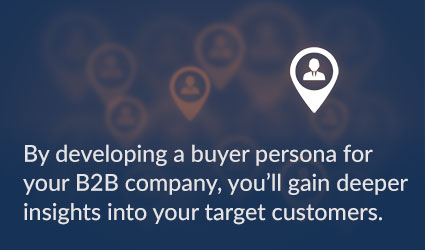
Importance of Using B2B Buyer Personas
Anyone who is trying to sell a product or service would likely agree on the importance of knowing their buyer, inside and out. In the B2C (business-to-consumer) world, buyer personas are a typical part of the marketing and sales strategy. But are personas really useful in business-to-business sales? The answer is yes – B2B buyer personas are a foundational piece of a comprehensive marketing and sales strategy.
What is a B2B Buyer Persona?
Okay, first: what is a buyer persona? According to HubSpot, a buyer persona is a “semi-fictional representation” of the perfect customer for your product or service. Basically, it’s a summary of a theoretical person that encapsulates the core traits of your ideal customer. A typical buyer persona will be given a fictional background story and a name (more on that later).
Then, as you build your marketing plan, you are able to check back against your personas and ask yourself: which one will consume this piece of content? Which one will care about this campaign? Will persona A be motivated by this message?
A B2C persona might be named something like “Mom Mindy” and have a description similar to: Mom Mindy is 45, lives in the suburbs, is married with 3 kids, is head of the PTA, and still finds time to hold down a job. She spends her quiet time on Pinterest, looking up home improvement ideas. She drives a minivan. Her household income is $100,000/year, and she shops at Costco to stretch her budget.
Right about now, you might be saying to yourself: who cares what kind of car my customer drives, or if they spend their spare time looking at paint samples? Well, retailers do, for sure. But what if you’re trying to sell B2B software, or capital equipment? This might seem like a waste of time.
Buyer Personas Really Do Help in B2B
By developing a buyer persona for your B2B company, you’ll gain deeper insights into your target customers, which let you figure out how to communicate with them, and how you help solve their biggest challenges. Personas help your marketing team craft relevant content to warm up leads, and help your sales team understand who they’re speaking – and selling – to.

When developing a B2B buyer persona, the key is to stay focused on what’s relevant to your business. You’ll want to define a few personas to make sure you’re addressing the key decision makers, influencers and even challengers in your buyer’s journey. Two to four is a good starting point; don’t make too many, at least at first – it will become hard to manage. Your B2B persona might be named something like “Process Engineer” or “R&D Manager”. I mean, you can name them something spicy if you really want, but remember to stay focused. You want to define:
- Job function/role: This could be something very specific like electrical engineer, head of operations or purchasing manager, or it could be a bit more broad like business unit manager or C-level executive. Think about the broad segments of people you interact with in a typical sales engagement.
- Buying role/function: Are they a decision maker, influencer, champion or challenger to your product or service? This will make a big difference in how you position your messaging, and what fears you may need to address.
- Demographics: Without getting too crazy, it is important to define this person as thoroughly as you can. Are they typically a certain gender, or is the role gender-neutral? Is there an age range (or, are they earlier or later in their career path)? Do they tend to be more or less affluent? More or less educated? Is there a specific geography (even if it’s just, they tend to live in a city rather than a rural location)? This high-level detail will help you tailor your language and message.
- Pain points: What are the biggest challenges in this person’s day to day life that your product or service will solve?
- Professional goals: Where is this person looking to go in their career? How can your product or service help them achieve their professional goals?
- Fears or concerns: What is this person afraid of? (Hint: I’m not talking about spiders.) Are they worried about automation taking their jobs? Will they get passed over for a promotion if they can’t help their company innovate? Or, is the fate of the entire business in their hands if they fall behind the competition?
- Watering holes: Where does this person go for information? Are they more likely to jump on Google, use social media, read a print trade pub or visit an industry conference? Are they looking for market-oriented white papers, engineering schematics, data sheets or maybe even videos? By figuring out where they go for information and how they like to receive it, you can determine which marketing channels and content types are most likely to reach them.
- Speak their language: What terms are going to be most impactful? If it’s a technical role, what industry jargon do you need to know? This will be important when crafting content that speaks to them.
Building & Using Your Persona
How do you find all this info? One good method is through interviews or surveys. Ask your best customers to tell you a bit about themselves. Then, do some third-party research through a tool like LinkedIn. Search for users with the job titles you’re targeting, and look through their profiles.
Pay attention to their credentials and backgrounds, as well as their skill set. Take note of the types of words they use to describe themselves, their jobs and their companies. All of this can provide hints into who they are.
You’ll then be able to use your personas to help refine your messaging. Follow these tips:
- Write your benefit statements to directly answer their pain points or fears.
- Define goals for each persona. For example, you may want one to request a demo, but another to recommend you to their purchasing team.
- Develop the types of content that you suspect will entice them, and promote it on the channels they’re already using.
- Speak their language wherever you can.
B2B buyer personas are an important part of a marketing strategy, but they don’t need to be intimidating. Do you want to discuss if your personas are working for you? Or, do you need help even getting started? We’re here for you – just let us know!


